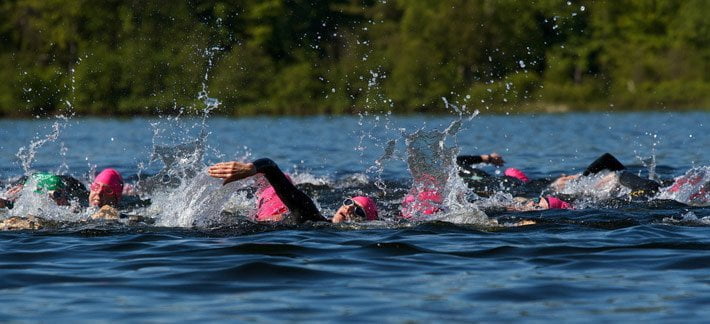
By Ariane Lavigne
So you are planning on doing a triathlon race (sprint, Olympic distance, IRONMAN)? You are not doubt well aware that nutrition plays a key role in your training progression and on your performance on race day. Here are a few things to consider:
Carbohydrate Loading:
- 2 to 3 days before your race, increase you carb intake (the main source of energy for muscles during endurance events). Aim for 7 grams of carbs per kilogram of body weight, per day, which would amount to about 500 grams per day for a person weighing 70 kg.
- 2 to 3 hours before the event, have a breakfast and beverages rich in carbs to reach 2 to 3 grams of carbs per kg of body weight (equals to 140 to 210 grams of carbs for a person weighing 70 kg). Avoid foods rich in protein and fat rich which are more difficult to absorb and digest.
Hydration:
- In the 2 hours before to the race, drink approximately 500 ml of liquid.
- Drink as soon as you finish your swim and plan on drinking about 500 ml (1 water bottle) of liquids per hour on the bike (adjust according to outdoor temperature and your level of perspiration). During the run, drink regularly; 3 to 4 sips every 15 minutes if possible.
- Plan to have electrolyte containing sports drinks with at least 500 mg of sodium per liter of liquid.
Energy source during the event
- During a triathlon, the bike section is the time to focus on maintaining energy levels. Aim for 40 to 60 grams of carbs per hour.
- For very long distances (half IRONMAN or IRONMAN), you can have up to 90 grams of carbs per hour on the bike (make sure you vary the types of carbs: ex. fructose and maltodextrin) and include, in divided portions, solid foods containing some protein and fat (ex. Energy bars, peanut butter sandwiches, dried fruit and nut mix).
2 supplements to consider…
- Caffeine from gel or sports drinks could reduce perception of fatigue when taken at a dose of 2 to 3 mg per kg of body weight (140 to 210 mg for a person weighing 70 kg) before or during effort.
- Nitrates found in beet juice or beet juice concentrate are known to reduce oxygen demand, which could, in turn, improve endurance. We suggest the equivalent of 500 ml of juice or a concentrated format with 8 mmol of nitrate, taken 2 to 3 hours before the race and ideally, daily starting 5 days before to the event.
Triathlete Menu Example
Here is triathlon national team athlete and Tremblant ambassador Francis Lefebvre’s diet before an Olympic distance triathlon.
One day prior to the race: Aims to carbohydrate load with 500 grams per day.
Diner 6 p.m.: about 140 grams of carbs
- 1 cup of mixed vegetables (5 grams of carbs)
- 2 cups of pasta with tomato and mushroom sauce (115 grams of carbs)
- ½ cup of plain yogurt with 1 tsp. of maple syrup and 1 tsp. of Chia seeds (20 grams of carbs)
Snack 9 p.m.: about 40 grams of carbs
- 1 ½ cup of cereal (ex. Cheerios) and 1 cup of milk 1%
Before the race: Aims for 2 to 3 grams of carbs per kg of body weight
Breakfast 6 a.m. (110 grams of carbs):
- 1 cup of apple sauce (30 grams of carbs)
- 1 cup of cooked oatmeal with 1 tbsp. of maple syrup (35 grams of carbs)
- 2 tbsp. of raisins (15 grams of carbs)
- 250 ml of juice (30 grams of carbs)
Snack 30 minutes before the starts (30 grams of carbs):
- 1 Fruitsource fruit bar
During the race (8:30 a.m. start): Aims for about 40 grams of carbs per hour
- On the bike: 2 Gogo squeeZ fruit sauce midway and before the running section. (30 grams of carbs)
- Bike and run: 1000 ml of coconut water (50 grams of carbs) with a pinch of salt (500-1000 mg of sodium).
Snack after the race: Aims for at least 60 grams of carbs with 15 grams of protein.
- 500 ml of chocolate milk and a banana.
Don’t forget: there is no miracle recipe. It is best to test and try foods and drinks during trainings to adapt quantities and product types according to your preferences, you individual tolerance, weather conditions and intensity of effort.




You must be logged in to post a comment.